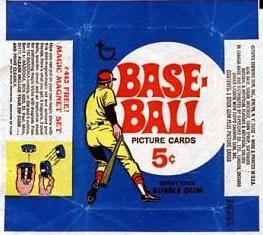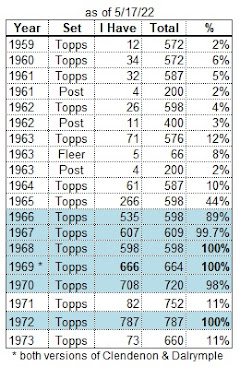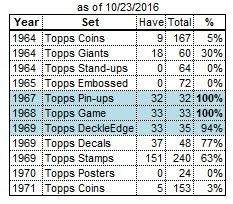Johnny Bench was the catcher on the Topps 1968 All-Rookie Team, and also the 1968 NL Rookie of the Year. This is Bench’s first solo card. He previously appeared on a Reds Rookie Stars card in the 1968 set.
Bench was selected by the Reds in the 2nd round of the 1965 draft (the inaugural “Rick Monday” draft) with the THIRTY-SIXTH overall pick. He was the EIGHTH catcher selected (behind Ray Fosse, Gene Lamont, Ken Rudolph, and 4 other backstops who never made it to the majors).
Johnny played 3 seasons (1965-67) in the minors, hitting 22 homers in ’66 and another 23 in ’67. He made his big-league debut on August 28, 1967 and started 26 of the Reds’ final 32 games.
In the off-season, 6-year incumbent starting catcher Johnny Edwards was traded away to clear a path for Bench, and the rest is history.
Bench made his first of 13 consecutive all-star rosters in 1968, and edged out the Mets’ Jerry Koosman by one vote for NL Rookie of the Year. He also won his first of 10 consecutive Gold Glove awards.
In 1970 and 1972, Bench led the NL in home runs (45, 40) and RBI (148, 125), and won the MVP award both seasons. He also led the NL with 129 RBI in 1974.
Johnny played in the NLCS and World Series in ’70, ’72, ’75, and ’76, and in the NLCS in ’73 and ’79. He grabbed the 1976 World Series MVP award after a .533 batting average and 6 RBI in the ’76.
In 1981, Bench was limited to just 52 games, mostly sharing 1st base with Dan Driessen, and only catching in 7 games. The following season he was the team’s regular 3rd baseman, starting 103 games at the hot corner, while only spending one inning behind the plate.
In his final season (1983), Johnny was a bench player (ha ha!), only starting 41 games at 3rd base, 29 at 1st base, and 3 behind the plate. After a 2-year absence, he made the all-star team in his final season, but it was as a symbolic gesture, as his impending retirement was announced prior to the season.
In 1986, Bench's number 5 was retired by the Reds, and he was inducted into the Reds Hall of Fame. He was elected to the Baseball Hall of Fame in 1989 with 96% of the vote in his first year of eligibility.
Monday, June 30, 2014
Friday, June 20, 2014
Stan Bahnsen (#380)
Stan Bahnsen was not only the righthander on the Topps 1968 All-Rookie team, he was also named AL Rookie of the Year. Stan appeared on Yankees Rookies cards in the 1967 and 1968 sets. This is his first solo card, and he had a card in every set through 1982.
Bahnsen was signed by the Yankees in 1965, and pitched 3 seasons in their farm system. He had a brief cup of coffee in September 1966, but didn’t return to the majors until April 1968.
He won 17 games as a rookie, as the Yankees #2 starter behind veteran Mel Stottlemyre. He also notched career-bests in strikeouts (162) and ERA (2.05) in his rookie year.
After an off-year in 1969, Bahnsen bounced back to win 14 games each in 1970 and 1971. After the 1971 season, he was traded to the White Sox for 3rd baseman Rich McKinney, and won 21 games in his first season in Chicago. Stan won 18 games the following season, but also led the AL with 21 losses.
Bahnsen pitched another year and a half for the Sox, then in June 1975 was traded to the Athletics for outfield prospect Chet Lemon. He started for the remainder of that season, but Oakland used him in relief during the ’76 and ’77 seasons.
In May 1977, Bahnsen was traded again, this time to the Expos for 1st baseman Mike Jorgensen. Stan joined the rotation that season, but was mostly a relief pitcher for his 4 full seasons in Montreal (1978-81).
The Expos released him 4 days before the season opener in 1982, and he was quickly picked up by the Angels. Stan pitched a combined 9 innings in 7 relief appearances, then was released by the Angels in mid-May. The Phillies signed him on May 31st, and he split his time between the Phillies and their AAA team in 1982. He was released after the season, and played for the Phillies’ AAA team in 1983 before retiring.
In 1992, he played for a team in The Netherlands.
Bahnsen was signed by the Yankees in 1965, and pitched 3 seasons in their farm system. He had a brief cup of coffee in September 1966, but didn’t return to the majors until April 1968.
He won 17 games as a rookie, as the Yankees #2 starter behind veteran Mel Stottlemyre. He also notched career-bests in strikeouts (162) and ERA (2.05) in his rookie year.
After an off-year in 1969, Bahnsen bounced back to win 14 games each in 1970 and 1971. After the 1971 season, he was traded to the White Sox for 3rd baseman Rich McKinney, and won 21 games in his first season in Chicago. Stan won 18 games the following season, but also led the AL with 21 losses.
Bahnsen pitched another year and a half for the Sox, then in June 1975 was traded to the Athletics for outfield prospect Chet Lemon. He started for the remainder of that season, but Oakland used him in relief during the ’76 and ’77 seasons.
In May 1977, Bahnsen was traded again, this time to the Expos for 1st baseman Mike Jorgensen. Stan joined the rotation that season, but was mostly a relief pitcher for his 4 full seasons in Montreal (1978-81).
The Expos released him 4 days before the season opener in 1982, and he was quickly picked up by the Angels. Stan pitched a combined 9 innings in 7 relief appearances, then was released by the Angels in mid-May. The Phillies signed him on May 31st, and he split his time between the Phillies and their AAA team in 1982. He was released after the season, and played for the Phillies’ AAA team in 1983 before retiring.
In 1992, he played for a team in The Netherlands.
Labels:
...ROY,
...Topps all-star rookie team,
.Yankees,
Stan Bahnsen
Friday, June 13, 2014
Jerry Koosman (#90)
Jerry Koosman was selected as the lefthanded pitcher on Topps' 1968 All-Rookie team. (My card is slightly out of register, making his name a little fuzzy.)
He played for 19 seasons, and is most-remembered for his first 12 seasons with the Mets. He came up around the same time as his Amazin’ Mets teammates Tom Seaver and Nolan Ryan, and although very successful early-on, fell short of Hall of Fame status.
Koosman was discovered while pitching in the Army, signed by the Mets in 1964, and pitched in the minors for 3 seasons (1965-67). In 1966, he recorded a 12-7 record while in class-A ball. In 1967, major-league teams began the season with 27 players, and didn’t need to cut down to 25 until early May. Jerry began the season with the Mets, but was sent down to triple-A in May, where he compiled an 11-10 record and 183 strikeouts in 25 games.
He made the Mets team permanently at the start of the 1968 season, and on the heels of Seaver’s Rookie of the Year performance in 1967, Koosman led the staff with 19 wins (for the 9th-place Mets, mind you) and missed out on the 1968 Rookie of the Year award by one vote (to Johnny Bench). Jerry also had a 2.08 ERA and made his first all-star team that season.
Kooz continued his excellence in 1969, going 17-9 with a 2.28 ERA and his 2nd (and final) all-star appearance. Although ineffective in the ’69 NLCS (11.75 ERA), he was 2-0 in the World Series against the Orioles.
Jerry continued with the Mets through the 1978 season (a year and a half past Seaver’s trade), winning in double figures 6 more times (including 21 wins in 1976).
In December ’78 he was traded to the Twins for pitcher Jesse Orosco. In 1979, and at age 36, Koosman was the Twins’ top pitcher, leading the team with 20 wins. The following season he was their top starter again, at 16-13.
In 1981, Koosman slumped to 3-8 during the (pre-strike) first half of the season. When the season resumed in mid-August, he was 0-1 in 7 games, and was traded to the White Sox on August 30th for 2 minor-leaguers and a guy named Randy Johnson (I thought it would be the Big Unit too, but it wasn't).
After a few appearances for Chicago in 1981, Koosman logged identical 11-7 seasons in ’82 and ’83, and in both seasons was a swingman for the only time in his long career.
The Sox traded him to the Phillies for pitcher Ron Reed in February 1984. In April he gave up Pete Rose’s 4000th hit, but posted a 14-15 record in his first season with Philly. Koosman’s final season not so good: only 6-4 in 19 games, with his last game on August 21st. He was released after the season.
He played for 19 seasons, and is most-remembered for his first 12 seasons with the Mets. He came up around the same time as his Amazin’ Mets teammates Tom Seaver and Nolan Ryan, and although very successful early-on, fell short of Hall of Fame status.
Koosman was discovered while pitching in the Army, signed by the Mets in 1964, and pitched in the minors for 3 seasons (1965-67). In 1966, he recorded a 12-7 record while in class-A ball. In 1967, major-league teams began the season with 27 players, and didn’t need to cut down to 25 until early May. Jerry began the season with the Mets, but was sent down to triple-A in May, where he compiled an 11-10 record and 183 strikeouts in 25 games.
He made the Mets team permanently at the start of the 1968 season, and on the heels of Seaver’s Rookie of the Year performance in 1967, Koosman led the staff with 19 wins (for the 9th-place Mets, mind you) and missed out on the 1968 Rookie of the Year award by one vote (to Johnny Bench). Jerry also had a 2.08 ERA and made his first all-star team that season.
Kooz continued his excellence in 1969, going 17-9 with a 2.28 ERA and his 2nd (and final) all-star appearance. Although ineffective in the ’69 NLCS (11.75 ERA), he was 2-0 in the World Series against the Orioles.
Jerry continued with the Mets through the 1978 season (a year and a half past Seaver’s trade), winning in double figures 6 more times (including 21 wins in 1976).
In December ’78 he was traded to the Twins for pitcher Jesse Orosco. In 1979, and at age 36, Koosman was the Twins’ top pitcher, leading the team with 20 wins. The following season he was their top starter again, at 16-13.
In 1981, Koosman slumped to 3-8 during the (pre-strike) first half of the season. When the season resumed in mid-August, he was 0-1 in 7 games, and was traded to the White Sox on August 30th for 2 minor-leaguers and a guy named Randy Johnson (I thought it would be the Big Unit too, but it wasn't).
After a few appearances for Chicago in 1981, Koosman logged identical 11-7 seasons in ’82 and ’83, and in both seasons was a swingman for the only time in his long career.
The Sox traded him to the Phillies for pitcher Ron Reed in February 1984. In April he gave up Pete Rose’s 4000th hit, but posted a 14-15 record in his first season with Philly. Koosman’s final season not so good: only 6-4 in 19 games, with his last game on August 21st. He was released after the season.
Thursday, June 5, 2014
Final Card: Joe Nossek
I’ve got 21 more “Final Cards” to post in the 1969 set, but haven’t done any since last October, so I’m going to squeeze one in here before I start down the path of featuring the Topps All-Rookie Team. Joe Nossek is the only one of the remaining 21 cards to have played more than 5 seasons in the majors. He finished up with 6 years of service time.
Joe Nossek (#143) was a member of the 1961 College All-American team, along with catcher Bill Freehan, pitcher Bill Faul, and future Twins’ teammate, shortstop Frank Quilici.
Joe was signed by the Minnesota Twins in 1961 and played 4 seasons in their minor-league organization. He made his major-league debut in April 1964, playing in 7 games at the start of the season (mostly as a pinch-runner) before returning to the minors in early May.
Joe returned to the majors on a full-time basis at the start of the 1965 season. He played in 87 games during his rookie season, mostly as a pinch-hitter and backup center fielder (to Jimmie Hall). Joe also made a few starts at 3rd base. Nossek appeared in 6 games in the 1965 World Series, and was the starting center fielder for games 2, 3, 5, 6, and 7 against the Dodgers’ southpaw starters. He went 4-for-20 (.200).
In mid-May 1966, Joe was sold to the Kansas City Athletics. He played in 87 games for the Athletics in both 1966 and 1967, sharing the starting center field job in 1966 with Roger Repoz and Jim Gosger, then caddying for rookie Rick Monday in 1967.
Nossek spent all of 1968 with Oakland’s AAA team in Vancouver, and was left out of the Topps set in 1968. It's surprising that he was back on Topps' radar in 1969. This is a low-numbered card, and he didn't see any playing time in the previous season.
He began the 1969 season with the A’s, but after 13 games (2 starts), he was sent down to the minors in mid-May, then traded to the Cardinals two months later for utility infielder Bob Johnson. The Cardinals called Joe up at the end of July, where he made 9 pinch-hitting or pinch-running appearances over the rest of the season.
It was back to the minors for almost all of 1970, with only one pinch-hitting appearance for the Cardinals in mid-September. It would be his last major-league game.
In February 1971 Joe was sold to the Brewers, but spent the year in triple-A before retiring.
After his playing career, Nossek was a coach for 28 seasons between 1973 and 2003, for the Brewers, Twins, Indians, Royals, and White Sox.
Joe Nossek (#143) was a member of the 1961 College All-American team, along with catcher Bill Freehan, pitcher Bill Faul, and future Twins’ teammate, shortstop Frank Quilici.
Joe was signed by the Minnesota Twins in 1961 and played 4 seasons in their minor-league organization. He made his major-league debut in April 1964, playing in 7 games at the start of the season (mostly as a pinch-runner) before returning to the minors in early May.
Joe returned to the majors on a full-time basis at the start of the 1965 season. He played in 87 games during his rookie season, mostly as a pinch-hitter and backup center fielder (to Jimmie Hall). Joe also made a few starts at 3rd base. Nossek appeared in 6 games in the 1965 World Series, and was the starting center fielder for games 2, 3, 5, 6, and 7 against the Dodgers’ southpaw starters. He went 4-for-20 (.200).
In mid-May 1966, Joe was sold to the Kansas City Athletics. He played in 87 games for the Athletics in both 1966 and 1967, sharing the starting center field job in 1966 with Roger Repoz and Jim Gosger, then caddying for rookie Rick Monday in 1967.
Nossek spent all of 1968 with Oakland’s AAA team in Vancouver, and was left out of the Topps set in 1968. It's surprising that he was back on Topps' radar in 1969. This is a low-numbered card, and he didn't see any playing time in the previous season.
He began the 1969 season with the A’s, but after 13 games (2 starts), he was sent down to the minors in mid-May, then traded to the Cardinals two months later for utility infielder Bob Johnson. The Cardinals called Joe up at the end of July, where he made 9 pinch-hitting or pinch-running appearances over the rest of the season.
It was back to the minors for almost all of 1970, with only one pinch-hitting appearance for the Cardinals in mid-September. It would be his last major-league game.
In February 1971 Joe was sold to the Brewers, but spent the year in triple-A before retiring.
After his playing career, Nossek was a coach for 28 seasons between 1973 and 2003, for the Brewers, Twins, Indians, Royals, and White Sox.
Subscribe to:
Posts (Atom)
.jpg)
.jpg)
.jpg)
.jpg)
.jpg)
.jpg)
.jpg)
.jpg)






.jpg)















